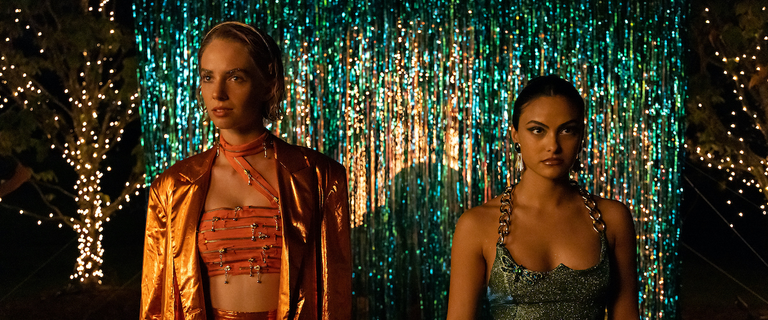Camila Mendes ("Riverdale") stars as Drea Torres, an understudy at Rosehill Non-public school who's fixated on getting into Yale. Tracy Flick-ish grant understudy, she's the sovereign honey bee of a hive that incorporates Tara (Alisha Boe), Meghan (Paris Berelc) and Montana (Maia Reficco). Drea is supposed to be famous however appears predominantly to be dreaded, and she has secret nerves. She's an acclimatized Mexican American who lives in a little house that she's embarrassed about. She figured out how to paw her direction to the highest point of the hierarchy at a transcendently white, favored secondary school regardless of being tormented by racial and class stresses. Toward the beginning of the story, she's large and in charge. High schooler Vogue even sets up her a Gatsby-debauched party to praise her triumphant the magazine's Youngster of the Year grant.
Then someone releases a Facetime video of Drea taking her garments off for the delectation of her similarly famous beau Max (Austin Abrams). All that Drea has accomplished liquefies away, and she's left broken and embarrassed. Drea expects Max released the video. Max denies it, however when senior year starts, he helps everybody to remember the champion's disgrace to get his own situation as the foundation's most noticeable and persuasive understudy. Max additionally establishes the Cis Hetero Men Advocating Female Distinguishing Understudies Association, an association that boasts about the "allyship" of its individuals yet is chiefly cover for Max and his brothers to womanize without getting called out as misanthropes. (The film has a definite touch with this sort of parody, scoring chuckles by recognizing how abnormal and senseless a portion of the responsiveness language sounds without limiting the torment of individuals who need more safeguards.)
Enter Eleanor (Maya Hawke), a bumbling white lesbian in standard-issue Hollywood slob clothing who's actually damaged by an episode that happened at day camp years prior. Eleanor and Drea become impossible companions, and Drea recommends trading retribution plots. Drea's includes giving Eleanor a makeover to change her into a hot weirdo rookie, catch Max's eye, and bring her into his internal circle, where she can acquire the trust and pick the cerebrums of the relative multitude of individuals who were complicit in Drea's destruction. It's ludicrously intricate even by the guidelines of secondary school films. Maybe a dressing in drag Shakespeare parody had been furnished with components from "Confused," "10 Things I Can't stand About You," "Political decision," "Rushmore," and "Horrible Expectations." (Sarah Michelle Gellar, star of "Savage Goals" as well as "Buffy the Vampire Slayer," plays a little part as the headmistress of Rosehill, who encourages Drea to channel her outrage as opposed to detonate in rage, as she did while blaming Max for releasing the video.)
The screenplay mines a couple of similar topical components as Robinson's MTV series "Sweet/Horrible," about a couple of undergrads who plot vigilante revenge against sexual aggressors; however the treats store visuals managed by ensemble fashioner Alana Morshead and creation originator Hillary Gurtler situate the story as a social parody with a sprinkle of empathy. Individuals do horrendous things to one another in this film, yet essentially a couple of them have the goodness to regret it.
"Do Vengeance" bears no more relationship to genuine secondary school than the movies that its producers love to such an extent. There are scarcely any grown-ups around that when a family member, instructor or director makes an appearance to move the story along, it seems like an interruption of predictability. Cinematographer Brian Burgoyne and supervisor Lori Ball plan with the chief to keep the film continually winding its direction forward while considering upscale elegance notes, for example, an Andersonian impeccably even laying out shot or a shapely needle-drop that utilizes most — and in something like one case, all — of a melody and there are multitudinous ensembles changes revealing outfits of regal delicacy. Praise to Robinson and cowriter Celeste Ballard for inclining toward the dream even as they reference it. The extravagantly delivered, over-plotted secondary school snakes flick is too settled a sub-classification as the Spaghetti Western. That implies there are sure perspective that all of them should contain or take a chance with estranging the crowd, like a makeover montage; a dramatically styled soul-exposing talk about injury; and a progression of heel-turns and face-turns that keep the crowd honest.
Saying significantly more regarding that last thing is not brandishing. Do the trick to say that the characters' feelings continue to take steps to wreck the objectives they set for themselves, whether they're solid or undesirable, and that the many straightforward conversations of duplicity, pantomime, and execution are text as well as subtext. Drea and Eleanor are awesome of companions until unexpectedly they aren't. Our assessment of Max stays in transition until the last venture. There's something else to Eleanor besides we at first expect; anything that you're foreseeing in your mind as you read this isn't exactly what the film gives you. (Hawke, who has her mom Uma Thurman's smoky-injured voice and her dad's easygoing smarty pants engage, plays each beat perfectly.)
The film takes as much time as necessary divulging the characters as a whole and bringing down the plot hardware into place. It might have been more limited and conveyed a similar story. However at that point you could never have gotten any of the long scenes of individuals talking and getting to realize each other that raise "Do Retribution" past pastiche. The characters are develops who are so mindful of themselves as builds (and the plot, as well) that there's actually not a great explanation for why we ought to feel for them, however we do, because of the lead exhibitions, the heading, and the joking/completely serious energy of the whole presentation.
